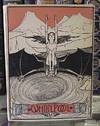

The Atomic Bazaar; The Rise of the Nuclear Poor
by Langewiesche, William
- Used
- Very Good
- Hardcover
- first
- Condition
- Very Good/Very good
- ISBN 10
- 0374106789
- ISBN 13
- 9780374106782
- Seller
-
Silver Spring, Maryland, United States
Payment Methods Accepted
About This Item
Synopsis
In the nuclear age, arms are the ultimate commodity. And now they are easier and cheaper to acquire and make than ever before - which means that for poor nations or non-state terror groups, weapons of mass destruction are up for grabs. William Langewiesche looks at how nuclear weapons have gone wholesale. He visits the smuggling routes in Turkey and closed Russian 'nuclear cities' where highly enriched uranium is on sale. He meets technicians, smugglers and spies. And he tells the extraordinary story of Abdul Qadeer Khan, the scientist who stole plans to build Pakistan's nuclear arsenal.
Reviews
(Log in or Create an Account first!)
Details
- Bookseller
- Ground Zero Books
(US)
- Bookseller's Inventory #
- 80868
- Title
- The Atomic Bazaar; The Rise of the Nuclear Poor
- Author
- Langewiesche, William
- Format/Binding
- Hardcover
- Book Condition
- Used - Very Good
- Jacket Condition
- Very good
- Quantity Available
- 1
- Edition
- First Edition [Stated], First Printing [Stated]
- ISBN 10
- 0374106789
- ISBN 13
- 9780374106782
- Publisher
- Farrar, Straus and Girouh
- Place of Publication
- New York, N.Y.
- Date Published
- 2007
- Keywords
- Nuclear Technology, A. Q. Khan, Nuclear Weapons, Nuclear Explosion, Proliferation, Nuclear Energy, Terrorism
Terms of Sale
Ground Zero Books
About the Seller
Ground Zero Books
About Ground Zero Books
Much of our diverse stock is not yet listed on line. If you can't locate the book or other item that you want, please contact us. We may well have it in stock. We welcome your want lists, and encourage you to send them to us.
Glossary
Some terminology that may be used in this description includes:
- Poor
- A book with significant wear and faults. A poor condition book is still a reading copy with the full text still readable. Any...
- First Edition
- In book collecting, the first edition is the earliest published form of a book. A book may have more than one first edition in...
- Fair
- is a worn book that has complete text pages (including those with maps or plates) but may lack endpapers, half-title, etc....

